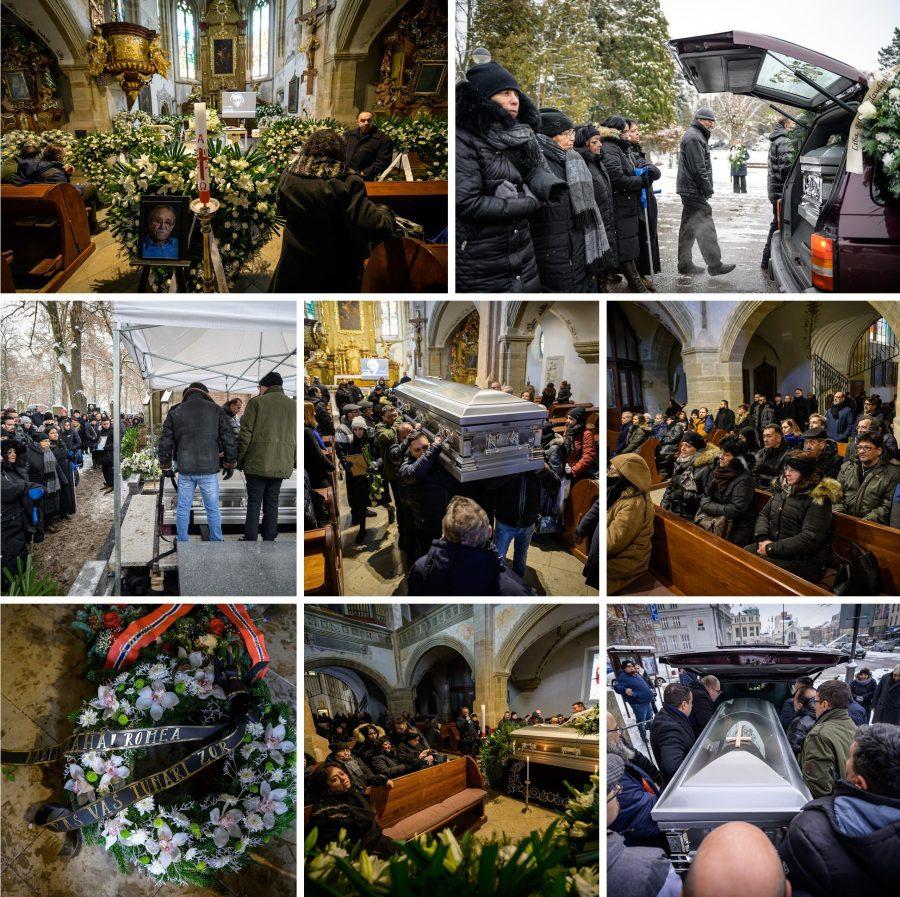"The truth will not just prevail. The truth shall set us free." Funeral of Čeněk Růžička takes place in Pardubice, Czech Republic

More than 200 people gathered in Pardubice, Czech Republic to pay their last respects to the Romani activist and chair of the Committee for the Redress of the Roma Holocaust, Čeněk Růžička. One of the most important Romani activists in the Czech Republic, he suddenly passed away from heart failure on Friday, 9 December 2022 at the age of 76.
The church service began just before 11 AM at the Church of Saint Bartholomew in Pardubice, which was almost completely full of mourners. Wreaths covered the floor of the church from the silver coffin to the front door.
Wreaths were brought by representatives of the Czech Senate, by the Czech Government Human Rights Commissioner Klára Laurenčíková, by representatives of the Embassy of the Kingdom of Norway, by the civil society members of the Czech Government Council on Roma Minority Affairs, by the Czech Culture Ministry, by the City of Pardubice, and by NGOs such as RomanoNet, ROMEA, Romodrom and others.
VIDEO
The mourners included Jan Husák, a civil society member of the Czech Government Council for Roma Minority Affairs; Andrea Baršová of the Office of the Government of the Czech Republic; Terje B. Englund, representative of the Embassy of the Kingdom of Norway; journalist Jarmila Balážová; author Iveta Kokyová; and the journalists Patrik Banga and Richard Samko. Others who came to pay their respects were his longtime friend, the journalist Markus Pape; Kumar Vishwanathan, Yechiel Bar-Chaim, Nikola Taragoš, Michal Miko, Josef Miker, Miroslav Brož, Lucie Fuková and many more.
“We have lost a living example of somebody who deeply understood his place in history, who shouldered a heavy responsibility without the slightest doubt, and who fulfilled his duties with a conviction that inspired all who met him. A man who knew who he was, was proud of who he was, knew his own worth, and knew what he was doing. He was not afraid to take risks, he was not afraid to speak his mind openly. His mind was free, and he was not afraid to use it,” said Gwendolyn Albert, a member of the Czech Government Council on Roma Minority Affairs, in her eulogy.
PHOTO GALLERY

“He genuinely believed in humanity. I personally witnessed how inventive, optimistic and creative he was. I was glad to consider him a genuine friend. I will always remember his laugh and how wonderful it was to see him light-hearted. Those moments are all the more unforgettable because they were so rare,” Albert said in her eulogy.
“The heavy sorrow we are feeling over the physical death of this remarkable human being will one day transform itself into enormous gratitude that we had the honor of hearing that firm conviction in his voice, the conviction of a person of genuine faith and hope. He shared his soul with us in all that he did. The truth will not just prevail. The truth shall set us free,” Albert closed her eulogy at the Church of Saint Bartholomew in Pardubice.
The coffin was then transported to the local cemetery by a procession of vehicles where, in the freezing weather, people continued to pay their respects. The mourning procession began at the cemetery gates and proceeded to the family grave plot where the coffin was interred, accompanied by a live performance of the Romani song Aušvicate hi kher báro [There’s a Large Building in Auschwitz].
Mr. Čeněk Růžička was born on 28 October 1946 in Liberec, Czechoslovakia. He came from a family of indigenous Czech Roma who had lived in the Czech lands for several centuries and who were tragically affected by the racial persecution of the Second World War.
His mother, Alžběta Růžičková, was imprisoned in the concentration camp for Roma at Lety u Písku, from whence she was then deported to Auschwitz-Birkenau, which she survived. Most of her family perished in the Holocaust.
In 1997, Mr. Růžička co-founded and then led the Committee for the Redress of the Roma Holocaust, through which he sought the dignified commemoration of Romani victims and compensation for Holocaust survivors until his very last moments. He fought for many long years to remove the industrial pig farm from the site of the concentration camp at Lety u Písku and to build a dignified memorial there.
In 2017 he was given the Alice Garrigue Masaryk Human Rights Award by the Embassy of the United States of America for his work. That same year he was given the Artis Bohemiae Amicis Award by then-Czech Culture Minister Daniel Herman, who expressed appreciation for his tireless efforts to achieve satisfaction for the Romani victims of the Holocause by organizing cultural activities, above all exhibitions on this subject.